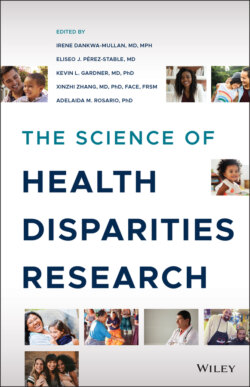Читать книгу The Science of Health Disparities Research - Группа авторов - Страница 72
4.4.1 Salud America!
ОглавлениеIn response to the high prevalence of obesity in Latino children and adolescents, researchers at the Institute for Health Promotion Research at the University of Texas Health Science Center at San Antonio, buoyed by support from the Robert Wood Johnson Foundation, led the creation of Salud America! The National Research Network to Prevent Obesity among Latino Children. In its first few years, Salud America! formed a national advisory committee, selected 20 pilot study investigators, and presented a Latino childhood obesity research priority agenda [31]. Investigators received an average of $75 000 to develop and implement promising policy‐relevant strategies to prevent and reduce obesity among Latino children. Awards were made across the country. Investigators believed the need for research and intervention was urgent because: childhood and adolescent overweight and obesity portend a propensity to adult overweight and obesity; healthcare costs rise dramatically for obese adults who were not at a healthy weight in childhood; and Latino children are vulnerable to marketers hawking unhealthy food to youth through television, social media, and other outlets.
One pilot investigator's approach included Photovoice, which encouraged parents and children to use photography to identify patterns or themes within their communities that were barriers to physical activity and root causes of inactivity. Among barriers participants noted were lack of access to activity programs outside school hours, lack of transportation, and communication problems. This involvement prompted them to make proposals for solutions within the community.
Other initiatives brought together mothers and daughters for physical activity; taught families about nutrition and how to evaluate grocery purchases; profiled understudied migrant farmworkers' children, almost half of whom were at unhealthy weights; and linked greater physical activity with higher performance in math. Others assessed the built environment, and still others addressed crime as an inhibitor of physical activity [10].
A second phase shifted Salud America! efforts into advocacy and policy development based on the evidence [31]. The program developed a Policy Contribution Spectrum to identify and describe the stages of policy development. Program leaders then developed an online multipronged strategy—research reviews, culturally relevant digital content curation, stories, videos, and action items in key aspects of Latino child and family health [10]—to inspire people to start and support healthy changes to policies, systems, and environments where Latino children and families can equitably live, learn, work, and play. The Salud America! program uses this content to fuel its social and online network of more than 125 000 moms and dads, providers, researchers, and community and school leaders to push for healthy changes in schools and communities for Latinos and all kids.
Overall, the Institute for Health Promotion Research team has created more than 100 national, statewide, local, and private research programs. The work not only produced results but also has generated new investigators, new funds, wider interest, and awards. The Institute has pursued expansion of Latino health initiatives, including research in childhood obesity [31], work in tobacco cessation among young adults [32], action on hepatocellular cancer [33], and attention to cancer health disparities in a recently launched national initiative [27].
